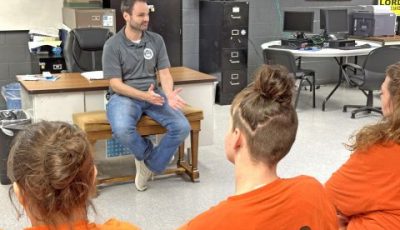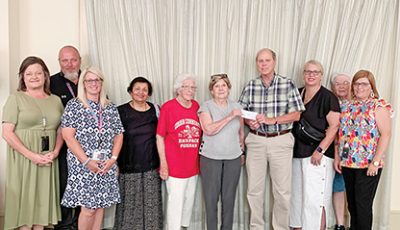Fourteen percent of working age adults in Whitley County don’t have high school diploma or GED
 Even with great strides made in recent years to keep kids from dropping out of school, about 14 percent of working age adults in Whitley County still don’t have a high school diploma or a GED.
Even with great strides made in recent years to keep kids from dropping out of school, about 14 percent of working age adults in Whitley County still don’t have a high school diploma or a GED.
“We are here helping people get a second chance on what they missed out on in the first place,” Keith Barnett, a career navigator with Whitley Skills U Adult Education Program, told the Williamsburg Kiwanis Club during its Feb. 14 monthly meeting.
“Sometimes the most awesome thing you can have is when you open somebody’s eyes that they can do better and that they can improve upon their situation. They don’t always think they can.”
In addition to skills like reading and math, the program also teaches students soft skills, such as the importance of showing up to work on time, how to dress appropriately for work, how to work with others, how to be professional, and time and money management skills.
“We are more than just a GED center. What I mean by that is we offer different work certificates, such as the International Career Readiness Certificate and the Kentucky Employability Skills Certificate and things like that to help people improve their lives and their family’s lives,” Barnett said. “Kind of our main calling card still is helping people get that GED to open up doors.”
In June, officials are planning a GED graduation ceremony, which will be the first one held in Whitley County in over 10 years.
Over the last two years, the number of students getting their GED in Whitley County has nearly doubled. From January 2014-May 2017, 25 people got their GEDs compared to 40 people since May 2017.
The average age of students that Barnett works with is people in their mid-30s. He has worked with students that are only 18 or 19 years of age, and with one person, who was 87 years old. The 87-year-old wasn’t planning to take the GED test, but had suffered a stroke and was trying to sharpen up some of his mental skills.
The amount of study time varies from student to student before they are able to pass the test.
Barnett said he has seen people pass the test after studying with him for one week, and saw another student pass the test after working for six years.
In 2014, the GED received a makeover, which has made it more difficult to pass. It is now more algebra-based.
The good news for test takers is that they can now pass the test’s individual sections one at a time, and don’t have to retake portions of the test that they have already passed.
Nearly everyone that goes through Barnett’s door has trouble with math.
Barnett has 10 students, who only lack passing the math portion of the test in order to get their GED degree.
He is hoping that an upcoming weekend clinic focusing on math will help those students get over the hump in terms of passing their math tests.
Barnett said that he also helps set up donation accounts to help people pay to take their GED test, which is $120 to take the whole test that is set up into four sections. It costs $30 to take each section of the test.
“That is quite a bit for a lot of people,” he noted.
Barnett can’t use taxpayer money to pay for people to take the test.
During the meeting, the Williamsburg Kiwanis Club voted to donate $120 to the adult education program to help a student or students take the GED test, and James Baker of James Baker Insurance added another donation of $120, which raised the total to $240.
Anyone wishing to make a donation to the program can contact Barnett at 549-1989.
Also, during the Feb. 14 meeting, the Williamsburg Kiwanis Club received an update that it had secured enough funding to purchase one special needs swing for a local park. The swing allows a parent and a special needs child to safely swing together at the same time.








